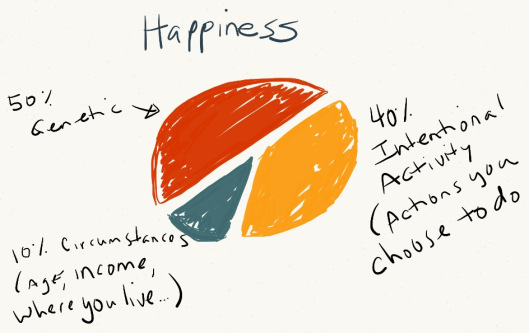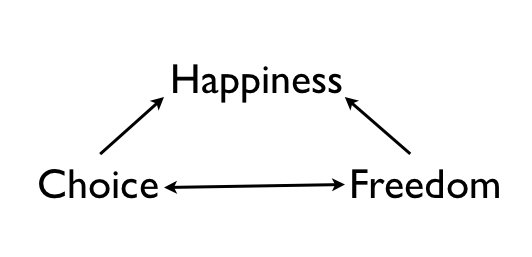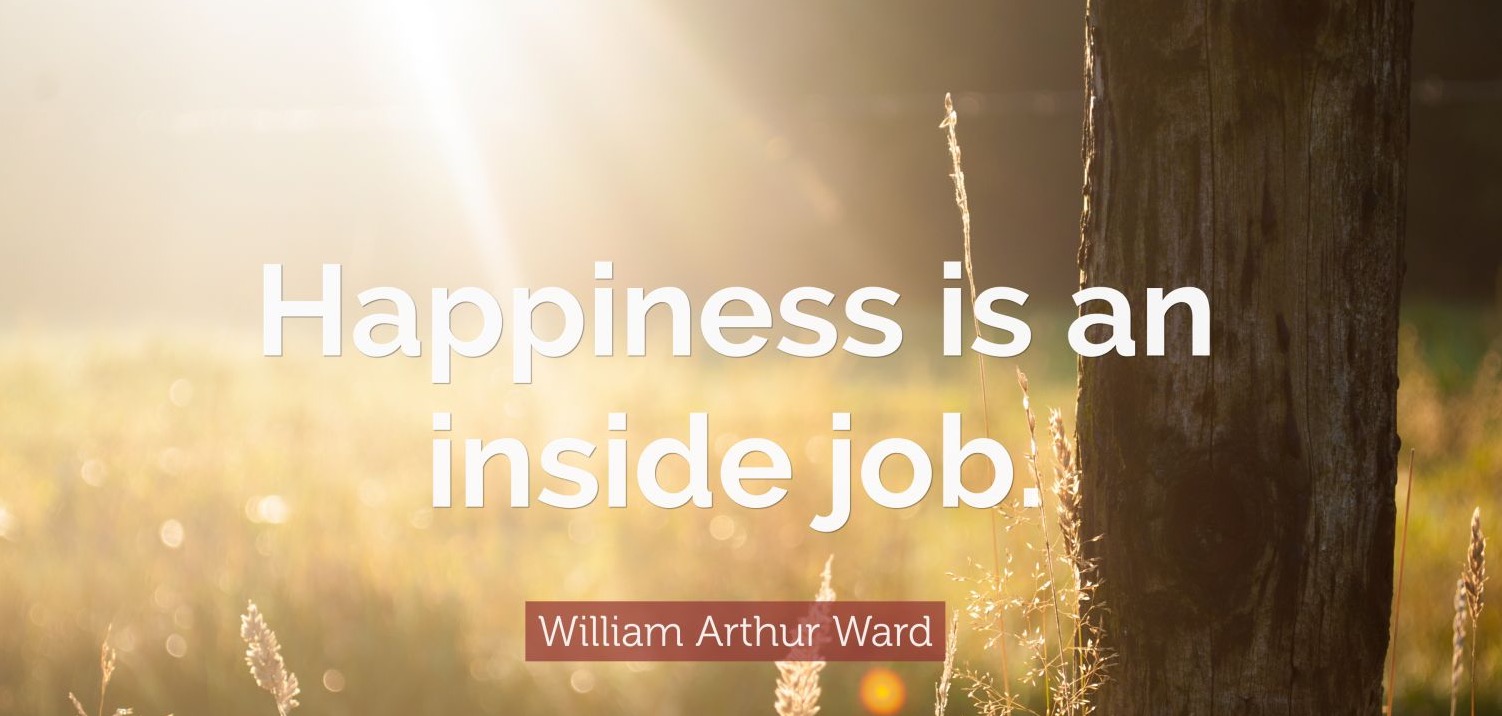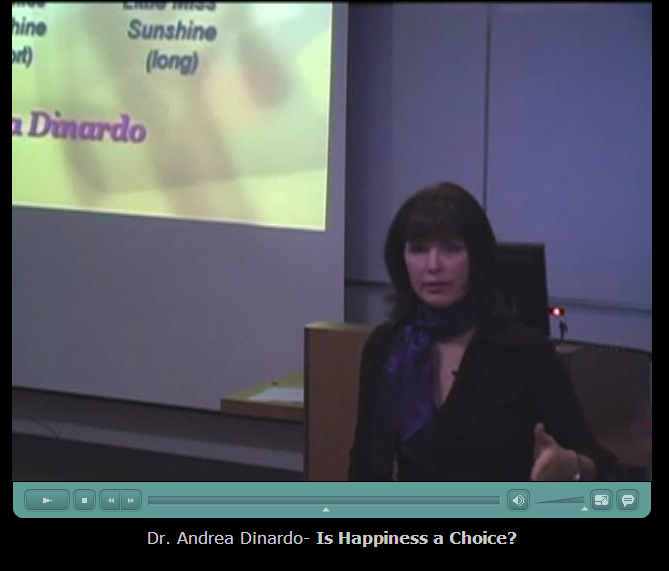The Happiness Question
Have you ever wondered why some people remain upbeat and positive despite the chaos that surrounds them while others are utterly miserable even in good times? What explains the difference between these two groups of individuals?

Are happy people just lucky people born happy? And unhappy people born miserable? Or is happiness a choice we make day by day, moment to moment?
The answer to this question is twofold. On one hand, 50% of happiness is predetermined by biology (e.g., inborn temperament) while the remaining 50% is influenced by life circumstances and intentional activities.

The Happiness Formula
As shown above, research indicates that approximately 40% of happiness is intentional activities (e.g., daily exercise, meditation, forgiveness), 10% is life circumstances (e.g., income), and 50% is genetic (e.g., temperament),
Though we may have little control over genetics and/or life circumstances — we do have personal agency when it comes to intentional activities. Be it a walk around the block, gardening in the backyard, or simply relaxing by the fire.

My Personal Experience
Being an optimist (and a positive psychologist), I tend to focus on the parts of life where I have influence. For both myself, and the people around me.
Even though you might not be the happiest (or healthiest, or richest, or most zen) person in the room, you (like me) have room (potential) to grow and expand – no matter your life circumstances or genetic make up.
YouTube Video: Can Trauma and Happiness Coexist?
The Happiness Webcast
In the presentation below, I explore the happiness formula (genetics vs. environment) in more detail. Including: 1) the developmental origins of happiness, 2) how individual differences in personality affect happiness, and 3) the paradoxical relationship between traumatic life experiences and happiness (posttraumatic growth).
Click on Is Happiness a Choice to learn more
Special note:
I take medical conditions such as clinical depression and anxiety into account when discussing “Is Happiness a Choice?” in my webcast. I underscore that intentional activities such as meditation, exercise, and proper nutrition will not cure mental illness, though they will help tremendously.
For example, medical research has demonstrated that exercise (an intentional activity) improves mood in individuals with anxiety and depression. And in turn, enhances personal agency and locus of control ⇐ the number one (environmental) contributor to happiness.
The Happiness Choice
- Celebrate your one-of-a-kind happiness. Do not compare it to your brother or your sister, or to a neighbour or a (facebook) friend. FOMO is the “thief of joy”. For what determines your happiness is unique to you to you, and only you.
- Embrace your freedom to choose experiences within your control (e.g., gratitude, helping others, forgiveness ), and the power to let go of what is not (e.g., the past, the opinion of others, the weather).
- Need help getting started? Try any or all of these 13 simple intentional activities over the course of a month, a day, or a year. The choice is yours!

Related Post: You hold the key



This is totally Awesome! It’s sometimes hard but I choose happiness daily…. hourly……
I love that Demby! The BIGGER the challenge, the smaller the steps. Choosing happiness HOURLY is a brilliant take on this post. Hope all is well!
The big thing we do in a digital age I think that impacts our true happiness is how we constantly compare our lives to that of people we view on social media we instantly develop insecurities and unhappiness as a result
So true Andrew! And the scary part is that we aren’t even comparing it to the “truth” of who someone is and/or their life circumstances. Instead we are belittling our psyche against a virtual 2D world. Which unfortunately, young people are especially vulnerable to. Because they don’t have the meta cognitive ability to distinguish between “worlds”. One more reason I love teaching psychology, I get to help break the ever increasing virtual illusion (of confusion). A major contributor to unhappiness and mental health challenges today.
I think psychology is becoming more and more prevalent in today’s modern world with both a combination of spiritual, holistic and modern medicine it opens a whole new door and path to treating mental health along with helping people build awareness and mindfulness in order to understand that they are merely living a reflection of someone Else’s one sided story
This is so interesting! Thank you for sharing – I’m going to have to try to formulate some better intentional activities!
Your fearless blog shows that you’re well on your way!
100+ awesome ideas and counting!
Thanks so much Andrea 🙂 I look forward to reading your posts!
😊😊😊
Hey Dr. Andrea! I wanted to let you know that I nominated you for the Sunshine Blogger award, for inspiring people and bringing sunshine to them. ☀️☀️☀️
💛☀️💛
Good article, but I was wondering, if happiness is 40% circumstance, what consists as bad circumstance? From what I’ve seen researching about the topic, it seems that people in poor countries can tend to be happier than people who amass great wealth
10% is life circumstances (not 40%) and 40% is intentional activities. And yes, excellent point, some of the happiest people live in the poorest countries. Most likely because of community support and relationships. Unlike North America where most people are more connected to social “media” than social “relationships” making life more meaningful. You might find this article interesting too: http://www.newyorker.com/business/currency/do-the-poor-have-more-meaningful-lives I also refer to this topic in my happiness webcast below.
My bad, I meant the 10% couldn’t find the comment to edit. And alright, thank you for your reply
All good! I love that you took the time to delve further into the topic. Best part of blogging = Connection. 😊
Agreed! Happiness is a really important topic for me, so I really liked your article, especially the pie chart approach. I’ve never come across it before
Oh wow, I love that I clicked on your post immediately after posting my own tonight reflecting on some of my own choices, and committing myself to daily meditation to try support myself to make more self-supporting choices. Thanks for a great article that really reaffirmed for me the power of putting routines and practices into place that support our intentions and our capacity for joyful awareness!
How wonderful Laurel! Writing about your intentions & choices underscores their meaning & motivation. And I couldn’t think of an intentional activity that captures freedom, choice, and support more than blogging. Wishing you joy & happiness! 🌸
Happiness is a choice for sure. It’s not always easy to stay happy, but you can work on surrounding yourself with positive people and participate in uplifting activities (like walks/jog, meditation, uplifting music, etc.).
Excellent happiness tips Ipuna! Ones I know you apply (choose) daily. Too often people incorrectly assume that happiness “just happens”. The luck of the draw. The fortunate genes. But as you know all to well, Happiness (like your garden) must be nourished daily to flourish. 🌷🌿
Yes! I definitely know people like that or even one or two that have said, “Why does all the good things happen to you.” Definitely not the case. I just choose not to dwell on the bad things that may cross my path. I deal with it, and then, I truck along to something more positive and productive. Beautiful garden analogy. 🌹
This is one reason I am so thankful for the science of epigenetics! That seemingly stone-hard 50% wedge might actually be malleable. I believe we could actually be in control of nearly 90% (or more) of our happiness. What do you think?
I agree wholeheartedly! Our genes are not fixed. The field of epigenetics gives us hope in “rising above” our genes (the literal translation of EPIgenetics). You may find this book interesting: https://www.newpagebooks.com/?section=home&product_id=466 It discusses how to unlock the hidden potential in our genes.
Thank you! I just added it to my Goodreads 🙂
I wasn’t able to get your video by my phone for some reason.
I will find another way but I wanted to tell you I love this..impactful ..insightful.
Thank you for letting me know. (I will add this clarification to my happiness post.) The video is in webcast format so it requires updated Adobe software for it to work. Most likely it will work on your computer, but not on your phone.
This message is critical for the work that I do. Because too often students & clients give up the hope of happiness. Whether it be because of a learning disability or mental health challenge. I believe that we all have potential when it comes to well-being. We all have room to grow. No matter the starting point. No matter the day. Happiness is within our reach.
Reblogged this on One Regular Guy Writing about Food, Exercise and Living Past 100 and commented:
This is a wonderful explanation of happiness and our own experience of it. I subscribe to Positive Psychology.
Tony
Thanks for sharing with your readers Tony!
Totally agree with what you said in this post! Thanks for sharing.
I have had to work hard to overcome being a Joy Thief. My mom and my grandmother both were Joy Thieves (you know them well; no matter how good the news is, or how happy you are about something, they have to point out a negative or a reason why that thing you’re so happy about is meaningless or hollow). I found myself being that way with friends and I decided that it wasn’t who I wanted to be. Every now and then, I find myself slipping back into it, but usually I catch it pretty quickly. This also has to do with my own happiness and outlook on life. I used to be a pessimist and defeatist. Now, I don’t let things get me down and I always find ways to use whatever negative thing is happening in my life to motivate me onward. Case in point: the scale. When my weight goes up due to having eaten something with sugar in it, I use my disappointment as fuel to be extra-diligent when it comes to watching my carb intake. I don’t let it get me down; I use it to fuel me through to success.
I love how self-aware you are! One of the most important intentional activities for happiness. And so key to transformational change. And I bet your joy thieving comes from an unconscious need to protect others and yourself. Thank you for sharing. Your openness helps us see the same personality trait in ourselves. Maybe not all the time. But certainly sometimes!
Great post. I need to revisit the video and I agree with the post. Do you think inborn temperment can be changed over time with daily positive habits?
Great question! I do believe that with positive habits, including good nutrition and sleep hygiene, we can stretch ourselves to the height of our inborn temperaments. This is something I address at length in my webcast.
The field of epigenetics also gives us hope in “rising above” our genes (the literal translation of EPIgenetics.) You may find this interesting: http://nobaproject.com/modules/epigenetics-in-psychology
Thank you I will revisit and watch the video
I loved reading this post. Your perspective on the topic is on point! I am so glad I followed your blog, such posts are food for the soul
It’s so important to realize that how we are in life has so much more to do with our daily habits & soul goals, and less to do with our circumstances and how “The Jones” are doing. We are given but one life. Thanks for commenting and for your positive feedback. Your encouragement means a lot.
Life is about 10% what happens to us & 90% how you react to what happens to us !
Amen Suyog!
Thanks Etta! It’s a question I ask myself (and almost everyone I meet) often. Both as a professional, and in my personal life. Positive psychology can make the assumption and/or push to hard for everyone to be “happy, happy, happy”. But there is so much more to the equation.
We all have a different happiness “set point” based on our genes & our environment. In the same way that we have a weight “set point”. What’s most important is what can we do “within our set range”.
Plus, it’s also important to remember how one defines happiness determines how it’s measured. For example, meaning and purpose are very different from indulgence, which is also different from ecstasy and joy.. and then we have peace of mind and contentment. All related to one’s happiness – yet only some of them are long lasting, while others are fleeting (and can be bought).
Ok.. you can tell I’m fascinated by this topic. Thanks for sharing my post on your site! 🙂
Reblogged this on Simply Etta D. and commented:
This is one awesome post!
Hey Dr. Dinardo! I’m so grateful for your thoughtful reply. These answers make sense and I feel like I understand the positive psychology perspective much more clearly. It’s good to hear that being positive is more of an aspiration than a constant expectation. And I remember the psychological vs. sociological perspective from college, but it’s helpful to see it iterated here. Thanks for being willing to share your perspective! And I can’t tell you how much I appreciate the feedback on my writing. I still struggle with negative thought and emotion, but simultaneously have discovered a place within myself that’s hopeful, and that’s what I strive to share with others. Have a great week!!
Watched this whole talk, really enjoyed it! The challenge to define happiness in one word and think about what made us most happy in the last twelve months was a good exercise. I also really enjoyed hearing the theories about reactive versus non-reactive children, and then ultimately about “hardiness.” The buzzword for “hardiness” that I hear all the time now is “resilience.” Having worked in schools with at-risk students and having general life experience with mental illness, I’ve heard about this a lot. If you don’t mind, I’d be really interested in your response to a couple of questions I have about it. One, where’s the line between harmful complaining and speaking up for something that is uncomfortable or wrong? On the flipside, can the urge to be “positive” all the time turn into denial of things that need to change? And then, here’s one I struggle with, particularly as a United States citizen witnessing so much social inequality: what ethical responsibility do we have to adjust the social environment to promote wellbeing? And what responsibility do we have to support non-resilient/non-hardy individuals? In the United States, there is a tendency to blame non-resilient individuals for their own situations, and to say “they could change if they want to.” While I believe people can change, at the same time, being raised in poverty or other adverse situations makes it harder, and I don’t believe people should suffer because they don’t know or don’t have the tools to change. I believe positive psychologists would take these factors into account, but I was wondering if you might provide your thoughts. I realize I wrote you a novel here, sorry about that, but I’m really interested. Thanks!!!
Great questions! 1/ Harmful complaining is chronic, repetitive, egocentric, debilitating, and exhausting. We are all guilty of this from time to time, especially when we feel powerless in a situation. 2/ Blowing off steam and/or speaking up for oneself has almost all the opposite qualities. It’s less frequent. It’s issue focused. It’s empowering. And it can be great for bonding.
Thank you for the clarification. Blowing off steam is definitely less frequent and issue focused, rather than ego focused.😊
Hi Again Jenna!
Here’s some more reflections /answers to your questions above –
Your question about being positive: I agree 100%. No one can. And no one should be positive all the time. Unfortunately, posts / articles about being positive can be taken too literally. I see positivity and happiness as aspirational (like a delicious meal) but not to be expected at every meal, all the time (sets us all up for disappointment on the Kraft Dinner days). Maybe I should start adding a qualifier to my positive psych posts.
What I tell my students is that as a professor/psychologist, it’s important to create a positive atmosphere for clients and students. But this doesn’t mean I’m happy 24/7. Rather, that I value creating a safe, consistent milieu for the people I’m responsible for. As future nurses, this is something I feel is critical to model in the classroom and in my writing. It’s authentic. I love what I do. That said, my actual mood fluctuates throughout the day. I let my moods flow through me. If I forced positivity (and I’ve tried, like all of us do) the result is anything but positive.
Your next question about being positive: Can being positive (all the time) be a defense mechanism / denial or interfere with motivation to change? Depends on the person. Also depends if it’s authentic happiness. Most people resist change no matter what. And they’re more likely to resist change if they are enjoying life as it is – even if what’s keeping them happy is maladaptive. (I’m going to do a post on embracing change vs. resisting change in a few weeks that incorporates agreeableness, neuroticism etc. from the Big 5 personality trait theory.)
Finally, your question about conditions and blaming someone for being non-resilient. That’s a bigger question. The way I’ve always tackled social change is to focus on the individual rather than society at large. There are so many examples of blaming the victim (for being non-resilient or non stress hardy). And if I too caught up in that mindset of changing the naysayers and oppressors (I have in the past), I lose hope and the energy / passion / faith I need to make a difference. Think of it as sociology/political science versus psychology.
That said, I’ve made the choice to focus on what is within my circle of influence. What I can do with each individual I meet (hoping for a ripple effect) to show respect and great admiration for their mental health challenges. This is one of the chief reasons I teach.
My ultimate goal as a psychology professor is to discuss mental health with young Canadians in a way that empowers them and encourages to be inclusive and non-discriminatory. Education mixed with warmth and real-life stories is the ultimate approach to teaching.
Jenna, your writing, is the most beautiful example of this. Keep doing what you do. You are changing lives. One word. One person. At a time.
Have an amazing week!
Very well said Andrea ! Your perspective towards life is certainly motivating ! Awaiting your post on embracing change vs resisting change !
Coming soon! 🙂 🙂
This video is great!! You’re a great teacher! Unfortunately I have to go to bed before I finished watching it, but I’m definitely going to finish it tomorrow. I’m excited to hear your perspective on positive psychology. It’s a concept I’ve struggled with, having seen a lot of people, happy and unhappy, thrive or flail in various circumstances, and having flailed about a lot in my own life. But I can’t make up my mind quite yet, so I’m looking forward to catching the rest of this.
Thanks Jenna! I really appreciate your feedback on my happiness talk and your curiosity about the subject. Positive psychology is my specialty. Psychologists like myself are prone to compassion fatigue and burnout and reframing our work with clients on strengths & solutions lifts us all up.